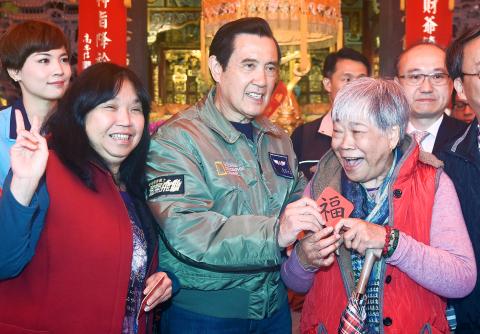With the new legislative session beginning today, the Democratic Progressive Party (DPP) caucus yesterday listed as priorities amendments that would significantly extend the prohibition period for visits to China by former presidents, vice presidents, generals and political appointees.
The caucus’ draft amendment to the Classified National Security Information Protection Act (國家機密保護法) seeks to extend the prohibition period for retired presidents and vice presidents from three years after their retirement to six years, while a draft amendment to the Act Governing Relations Between the People of the Taiwan Area and the Mainland Area (台灣地區與大陸地區人民關係條例) aims to extend the period during which retired generals are barred from visiting China.
The DPP caucus’ prioritization of the bills for review drew protest from former president Ma Ying-jeou (馬英九), who last month said that he did not rule out visiting China after his three-year ban is lifted on May 20.

Photo: Liao Chen-huei, Taipei Times
Ma’s office yesterday issued a statement criticizing the DPP, saying that attempting to push through the “unconstitutional” amendments was politicking, would aggravate ideological conflicts and would neglect legislation related to energy and people’s livelihoods.
Chinese Nationalist Party (KMT) Chairman Wu Den-yih (吳敦義) also blasted the plans to extend the prohibition periods for former officials, saying that they contravene the basic legal principle of respecting precedent and avoiding ex post facto lawmaking.
Arbitrarily lengthening the travel ban would set a bad example for following administrations, he said.
“If they do whatever they want, who is to say that the KMT will not lengthen the ban to 30 years for former officials?” Wu said.
DPP caucus director-general Lee Chun-yi (李俊俋) denied that the proposed amendments target Ma and Wu, saying that they were designed to prevent the leaking of state secrets, such as the case of former army general Lo Hsien-che (羅賢哲), who was convicted for leaking military secrets to China from 2004 to 2011.
It is not certain that the amendments would be passed before May 20, he said.
Separately yesterday, when asked for comment on the prioritization of the bills and the intent of such a move, Executive Yuan spokeswoman Kolas Yotaka said that the Cabinet would finalize its list of priority legislation after a meeting with DPP lawmakers on Monday next week.
The content of the Cabinet’s draft amendments to the two acts largely coincides with that of the caucus’ proposals, she said.
The Executive Yuan has drafted its own amendments because “national security allows no compromise,” she added.
Additional reporting by Jonathan Chin

A magnitude 7.0 earthquake struck off Yilan at 11:05pm yesterday, the Central Weather Administration (CWA) said. The epicenter was located at sea, about 32.3km east of Yilan County Hall, at a depth of 72.8km, CWA data showed There were no immediate reports of damage. The intensity of the quake, which gauges the actual effect of a seismic event, measured 4 in Yilan County area on Taiwan’s seven-tier intensity scale, the data showed. It measured 4 in other parts of eastern, northern and central Taiwan as well as Tainan, and 3 in Kaohsiung and Pingtung County, and 2 in Lienchiang and Penghu counties and 1

A car bomb killed a senior Russian general in southern Moscow yesterday morning, the latest high-profile army figure to be blown up in a blast that came just hours after Russian and Ukrainian delegates held separate talks in Miami on a plan to end the war. Kyiv has not commented on the incident, but Russian investigators said they were probing whether the blast was “linked” to “Ukrainian special forces.” The attack was similar to other assassinations of generals and pro-war figures that have either been claimed, or are widely believed to have been orchestrated, by Ukraine. Russian Lieutenant General Fanil Sarvarov, 56, head

‘POLITICAL GAME’: DPP lawmakers said the motion would not meet the legislative threshold needed, and accused the KMT and the TPP of trivializing the Constitution The Legislative Yuan yesterday approved a motion to initiate impeachment proceedings against President William Lai (賴清德), saying he had undermined Taiwan’s constitutional order and democracy. The motion was approved 61-50 by lawmakers from the main opposition Chinese Nationalist Party (KMT) and the smaller Taiwan People’s Party (TPP), who together hold a legislative majority. Under the motion, a roll call vote for impeachment would be held on May 19 next year, after various hearings are held and Lai is given the chance to defend himself. The move came after Lai on Monday last week did not promulgate an amendment passed by the legislature that

FOREIGN INTERFERENCE: Beijing would likely intensify public opinion warfare in next year’s local elections to prevent Lai from getting re-elected, the ‘Yomiuri Shimbun’ said Internal documents from a Chinese artificial intelligence (AI) company indicated that China has been using the technology to intervene in foreign elections, including propaganda targeting Taiwan’s local elections next year and presidential elections in 2028, a Japanese newspaper reported yesterday. The Institute of National Security of Vanderbilt University obtained nearly 400 pages of documents from GoLaxy, a company with ties to the Chinese government, and found evidence that it had apparently deployed sophisticated, AI-driven propaganda campaigns in Hong Kong and Taiwan to shape public opinion, the Yomiuri Shimbun reported. GoLaxy provides insights, situation analysis and public opinion-shaping technology by conducting network surveillance